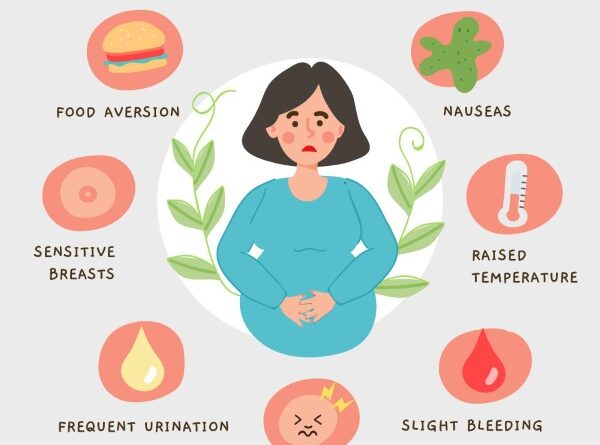First Month Pregnancy Symptoms: Recognizing the Early Signs of Pregnancy
First Month Pregnancy Symptoms, the first month of pregnancy, also known as the first trimester, is a critical time for both the expectant mother and the developing fetus. During this period, the body undergoes significant changes as it adapts to support the growing life inside. While not all women experience the same symptoms, there are several common signs that may indicate the early stages of pregnancy. In this comprehensive guide, we will delve into the various first-month pregnancy symptoms, how they occur, and what you can do to cope with them.
Missed Menstrual Period (First Month Pregnancy Symptoms)
First Month Pregnancy Symptoms, one of the most common and reliable signs of pregnancy is a missed menstrual period. If your menstrual cycle is regular, missing your period can be a strong indicator that you might be pregnant. However, some women may still experience light bleeding or spotting even after conception, leading to confusion. It’s essential to take a home pregnancy test or visit your healthcare provider to confirm pregnancy if you suspect you might be pregnant after a missed period.
Nausea and Morning Sickness

First Month Pregnancy Symptoms, Nausea and morning sickness often make their appearance in the first month of pregnancy. Though the name implies morning sickness, it can occur at any time of the day. The exact cause of morning sickness is not fully understood, but hormonal changes and increased sensitivity to certain smells and tastes are believed to play a role. Coping strategies, such as eating small, frequent meals, staying hydrated, and avoiding triggers, can help manage this common symptom.
Fatigue and Increased Tiredness
First Month Pregnancy Symptoms, During the first month of pregnancy, the body undergoes significant hormonal changes, including increased levels of progesterone, which can lead to feelings of fatigue and tiredness. It’s important to listen to your body and get ample rest. Taking short naps and incorporating gentle exercise into your routine can help combat fatigue.
Breast Changes
First Month Pregnancy Symptoms, Breast tenderness and changes are also common early signs of pregnancy. The breasts may feel swollen, tender, or sore due to hormonal fluctuations. Wearing a supportive bra and avoiding harsh chemicals on the skin can provide relief.
Frequent Urination
First Month Pregnancy Symptoms, As the uterus expands and hormonal changes take place, some women may experience increased frequency of urination during the first month of pregnancy. The growing uterus puts pressure on the bladder, leading to more frequent trips to the restroom.
Mood Swings
Hormonal fluctuations can also cause mood swings during early pregnancy. You may find yourself feeling more emotional or experiencing heightened sensitivity. Practicing stress-reducing techniques, like yoga or meditation, can help stabilize emotions.
Food Cravings and Aversions
Many pregnant women experience food cravings and aversions during the first month. Cravings for specific foods or combinations might occur, while certain smells or tastes may suddenly become repulsive. It’s essential to listen to your body’s signals while maintaining a balanced diet.
Bloating and Constipation
Hormonal changes can also slow down digestion, leading to bloating and constipation. Drinking plenty of water, consuming fiber-rich foods, and engaging in light exercise can help alleviate these symptoms.
Increased Basal Body Temperature (BBT)
Tracking your basal body temperature can be an early indicator of pregnancy. After ovulation, if your BBT remains elevated for more than two weeks, it may suggest pregnancy.
First Month Pregnancy Symptoms is an exciting and transformative time for expectant mothers. Understanding and recognizing the early signs of pregnancy can help women embrace the changes they will experience. It’s important to remember that each pregnancy is unique, and not all women will experience the same symptoms. If you suspect you may be pregnant, taking a home pregnancy test or consulting your healthcare provider for confirmation and guidance is crucial. Throughout this remarkable journey, ensuring proper prenatal care, a healthy lifestyle, and emotional support will contribute to a positive and fulfilling pregnancy experience.
See this also.




